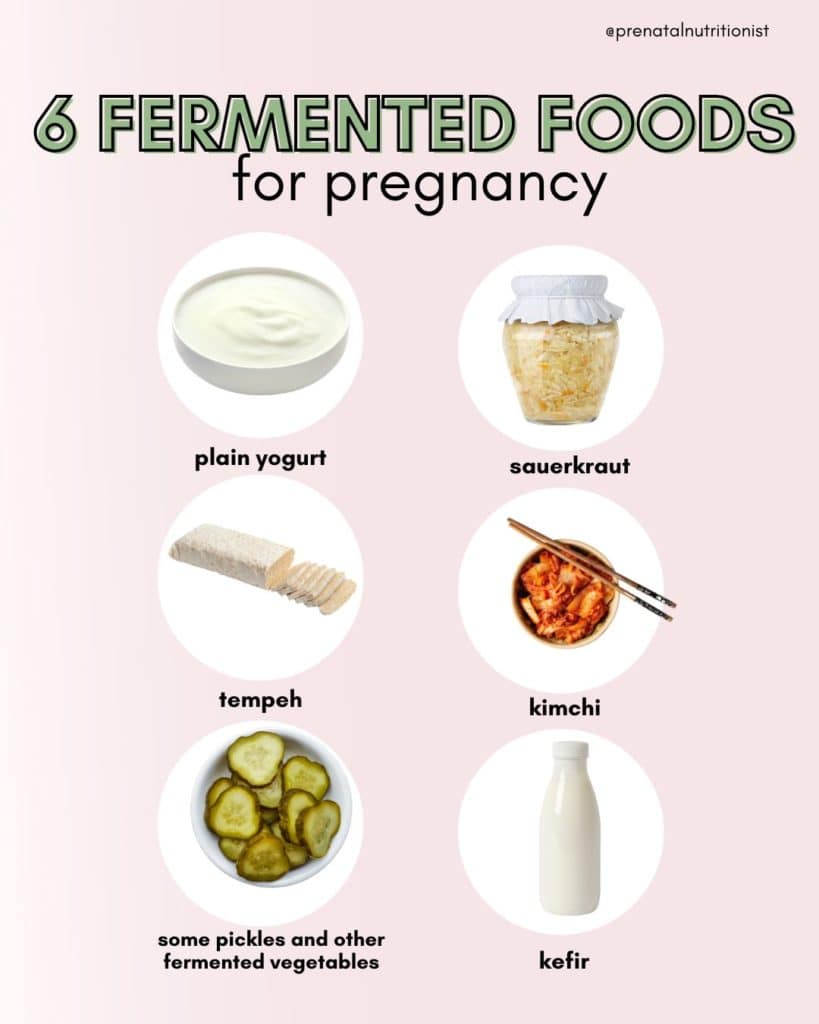What are fermented foods?
Did you know there are over 5000 fermented foods and beverages (1)?
Food can be fermented by adding in bacteria or yeasts (cultured ferments) or by creating an environment that enables bacteria to grow and ferment naturally on the food (wild ferments).
Almost every culture in the world has its own traditional fermented foods.
Some probiotic-rich fermented foods from around the world include:
- Kimchi from Korea
- Natto from Japan
- Miso from Japan and Korea
- Kombucha from Russia and Ukraine
- Curtido from El Salvador
- Kefir from Eastern Europe
- Sauerkraut from Germany
- Creme fraiche from France
- Kvass from Russia
- Torshi from the Middle East
- Doogh from Iran, Syria, and Lebanon
It’s important to note that not all fermented foods have probiotics! We’ll discuss this further in the section after next.
What is fermentation?
Fermentation occurs when microorganisms and enzymes convert carbohydrates into alcohol or organic acids (2). This process produces probiotics, as good bacteria feed on sugar and starches in the food, creating lactic acid.
The acids prevent harmful microbes that cause food spoilage, so historically, fermentation was used to help improve food’s shelf life.
There are three primary forms of fermentation:
- Lactic acid fermentation: Starches or sugars are broken down to produce lactic acid, which protects the food from microbial spoilage and our bodies from microbial disease. Lactic acid fermentation is used for yogurt, pickles, and sauerkraut.
- Ethanol (aka alcohol) fermentation: Yeasts break down sugars into alcohol and carbon dioxide molecules to create wine, beer, and bread.
- Acetic acid fermentation: Converts sugars from grains or fruit into vinegar and condiments.
What fermented foods count as probiotic foods?
A probiotic food must contain live microorganisms. However, certain cooking, processing, or pasteurization can drastically reduce or kill off the most beneficial microbes in certain foods. Foods like tempeh contain para-probiotics or postbiotics since they are cooked rather than raw (9, 10). These are non-active probiotics that still provide health benefits.
Fermented foods that qualify as probiotic-rich foods include:
- Kimchi
- Sauerkraut
- Miso
- Yogurt
- Some cottage cheeses (such as Good Culture or Nancy’s– check ingredients for probiotic strains listed)
- Kombucha
- Kefir
- Some pickles (These will be refrigerated and are often labeled as “lacto fermented” or “naturally fermented.”)
- Raw dairy, including milk and cheeses (only consume if you are completely comfortable with the source)
- Fermented veggies
Fermented foods that do not qualify as probiotic foods include:
- Sourdough bread contains some probiotics in the starter but not in the finished baked product, as most are likely unable to survive the high heat.
- Chocolate: cocoa beans are lacto-fermented, but roasting kills them
- Coffee: good bacteria are killed during processing
- Soy sauce: traditional soy sauce contained fermented soybeans, but most now do not
- Fermented meats (chorizo, salami, pepperoni): sodium nitrate and other additives kill the bacteria
- Alcohol: most are killed by ethanol (unless unfiltered or unpasteurized beer with brewer; however, it’s not recommended you consume this as a source of probiotics)

Are fermented foods safe for pregnancy?
Yes!
Not only are fermented foods safe for pregnancy, but they should be consumed regularly (daily, even) for optimal health.
Are raw fermented foods safe for pregnancy?
In general, yes. As long as the source is reliable and takes appropriate food safety precautions, you can consume raw probiotic foods, such as sauerkraut or other veggie-based fermented foods. Remember, pasteurization, the heat treatment process, kills both the good and bad bacteria in foods, which is why raw products provide the most benefits.
Most commercially packaged raw probiotic foods (such as Wildbrine and Cleveland Kraut) are safe to enjoy during pregnancy.

Why are fermented foods so important for fertility, pregnancy, and postpartum?
Probiotic-rich fermented foods are a must for optimizing health during conceiving, pregnancy, and postpartum.
Some of the well-known and established benefits of fermented foods include (3):
Support gut health
In general, consuming fermented foods increases the diversity of gut microbes and reduces inflammation (3).
Eating foods such as yogurt, kefir, cheese, kombucha, sauerkraut, and kimchi has been found to increase overall microbial diversity, with even more pronounced effects from larger servings (4).
Besides improving gut health overall, probiotic-rich foods can significantly help reduce constipation. So, if you are trying to increase your regularity during pregnancy, ensure you get at least one serving of probiotic foods daily!
Boost your immune system.
Since 70% of your immune system is housed in your gut, it makes sense that any gut-supportive foods will also significantly boost your immunity (5)!
Probiotic foods have been found to activate the immune system, improve the overall immune system function, and prevent or better manage immune and inflammatory-related conditions (such as IBD) (6).
Support blood sugar regulation.
Whether you are trying to improve blood sugar regulation to improve fertility, support a healthier pregnancy, or manage gestational diabetes, probiotics are crucial!
Probiotic consumption has been found to significantly reduce fasting glucose and fasting plasma insulin (7).

Support healthy blood pressure.
One meta-analysis found a moderate and statistically significant reduction in SBP or DBP with a probiotic supplement compared with controls (8).
The positive effects of probiotics on blood pressure lasted for 8-10 weeks after consumption, so make sure you are consuming them weekly (at least) to maintain the benefits!

Which fermented foods should I prioritize during pregnancy?
You can’t go wrong with any fermented foods you love and wish to include in your diet while trying to conceive, during pregnancy, or to support postpartum recovery, but here are some of the top foods that contain the largest concentration of gut-friendly probiotics:
- Natto
- Kimchi
- Sauerkraut
- Miso
- Kombucha
- Greek yogurt
- Kefir
- Cottage cheese (just make sure yours has probiotic strains listed in the ingredients!)
How can I include fermented foods in my diet during pregnancy?
Include whichever fermented foods you enjoy the most. If you are new to fermented foods, try a new one each week and new recipes using them to figure out what you like.
Here are some ways you can include the recommended foods above into your meals and snacks each day:
- Add sauerkraut or kimchi to your eggs, any veggie mixture, toast, with tuna or chicken salad, on top of a baked potato, with smoked salmon, or as part of a charcuterie plate
- Make a Greek yogurt or cottage cheese parfait as part of your breakfast or for a snack
- Enjoy sauerkraut or kimchi wrapped up in slices of deli meat
- Make a traditional egg natto breakfast bowl
- Top a sausage with sauerkraut
- Add a cup of kefir or yogurt to a smoothie
- Make miso chicken soup

The Bottom Line
- There are over 5,000 types of fermented foods and beverages. Food can be fermented by adding bacteria or yeasts (cultured ferments) or by creating an environment that enables bacteria to grow and ferment naturally on the food (wild ferments).
- Fermentation happens when microorganisms and enzymes convert carbohydrates into alcohols or organic acids. This process produces probiotics, as good bacteria feed on sugar and starches in the food, creating lactic acid.
- Not only are fermented foods safe for pregnancy, but ideally, you would include them several times per week, if not daily. Raw fermented foods, like sauerkraut, kimchi, or other fermented veggies, are also safe and recommended for pregnancy. Remember, pasteurization kills both the good and bad bacteria in foods. Some foods will have bacteria strains added back to them for this reason.
- Fermented foods have many benefits, including supporting gut health, boosting immunity, regulating blood sugar, and maintaining healthy blood pressure.
- Some top fermented foods to consume regularly during preconception, pregnancy, and postpartum include natto, kimchi, sauerkraut, miso, kombucha, Greek yogurt, kefir, and cottage cheese.
Written by: Claire Gilmore, MSCN, CNS, LDN and Ryann Kipping, MPH, RDN, LDN


